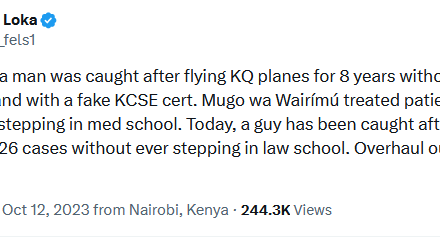In the gripping theatrical piece Echoes of War, the playwright crafts a powerful critique of political power and societal disillusionment, indirectly alluding to the administration of President William Ruto. The play is set in a fictional country haunted by the remnants of a civil war, yet its dialogue and characters unmistakably reflect the present-day Kenyan political climate. Through haunting monologues, broken promises, and sharp satire, the narrative scrutinizes the failures of governance and the deepening divide between leaders and the citizenry.
The Plot: Shadows of the Past, Echoes of the Present
The story unfolds in the aftermath of a brutal war. The country’s ruling elite, once rebels fighting for justice, have now become the very tyrants they overthrew. The people are disillusioned, the youth unemployed, and basic services—education, health, infrastructure—lie in ruin. The government’s rhetoric is full of promises and patriotic platitudes, but daily life tells a different story.
The protagonist, an ex-soldier named Jabari, becomes the voice of the people. Jabari speaks not just of lost dreams but of betrayal by those who once claimed to fight for freedom. His impassioned soliloquies draw direct parallels to the voices of modern-day Kenyans who feel let down by politicians who campaigned as reformers but now preside over economic turmoil, inflated taxes, and a ballooning national debt.
Political Allegory and Allusions to Ruto’s Government
Though never named, the ruling regime in the play bears striking similarities to the administration of President William Ruto. The leader in the play, President Kiongozi, came to power championing the “hustler” narrative, promising inclusion, opportunity, and economic empowerment. Yet under his rule, cronyism thrives, taxes rise, and public trust erodes. These reflections mirror criticisms levelled at Ruto’s government, particularly regarding Kenya’s high cost of living, perceived nepotism, and the use of state machinery to suppress dissent.
Even the term “bottom-up,” echoed satirically in one of the scenes, nods to Ruto’s real-life campaign slogan. But in the world of Echoes of War, the bottom remains crushed under economic burden while the top flourishes.
The Role of Art in Political Resistance
Echoes of War is a testament to the enduring power of art as resistance. It doesn’t preach—it pierces. With sharp dialogue and unsettling silences, it captures the moral fatigue of a nation. The play doesn’t just criticize politicians; it critiques the societal silence and complicity that allows corruption and mediocrity to thrive.
Young characters, particularly the student Asha, symbolize a new generation unwilling to accept the status quo. Her defiant speeches and hunger for truth remind audiences that change often begins in the margins, with voices that refuse to be silenced.
A Call to Reflection, Not Just Action
More than just entertainment, Echoes of War is a call to national introspection. It invites viewers to question who we allow to lead, how history repeats itself, and whether freedom is ever truly achieved or just rebranded by new faces.
Its allusions to the Ruto government aren’t blunt accusations—they’re echoes. But like all echoes, they resonate only if there’s truth to bounce off. The play’s final lines—Jabari standing alone, whispering into the void—are not just poetic; they’re prophetic.
Echoes of War is a poignant and fearless artistic critique that taps into the frustrations of a people whose hopes have turned to dust. Its subtle but searing references to Kenya’s current political leadership, especially the Ruto regime, offer audiences a lens through which to reevaluate promises made versus realities lived. It is more than a play—it is a national mirror.
It is worth noting that the play was to be performed by Butere Girls High School. The play was written and directed by Cleophas Malala, a former UDA Secretary General. UDA is President Ruto’s ruling party.
Read/Download a copy here:
Echoes of war as presented in court:


